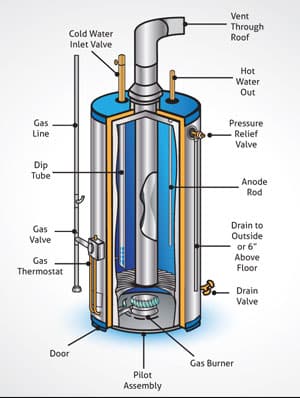
In Georgia, adhering to specific building codes for water heaters ensures safety, efficiency, and proper operation. Whether you’re installing a new unit or replacing an old one in Woodstock, GA, understanding these requirements is essential. Here’s a comprehensive guide to water heater regulations in Woodstock, including key components like stands, blankets, earthquake straps, and more.
Water Heater Replacement
All water heaters installed in Woodstock must comply with Georgia state building codes. Key requirements include:
- Temperature and Pressure Relief (TPR) Valve: Every water heater must have a TPR valve to release excess pressure. Ensure the discharge pipe extends within 6 inches of the floor or drain and is not capped.
- Capacity: Select the water heater size based on your household’s needs:
- 30-40 gallons for 1-2 people.
- 50-60 gallons for 3-4 people.
- 75+ gallons for larger households
- Water Heater Stand - A water heater stand is required to elevate the unit at least 18 inches off the ground for gas water heaters installed in garages. This prevents the ignition of flammable vapors, such as gasoline, which may be present in the garage.
- Water Heater Blanket- Although not mandatory, a water heater blanket is recommended for improving energy efficiency. It helps reduce heat loss, especially in older or less insulated models, thus lowering energy consumption.
- Earthquake Straps - Even though Georgia, including Woodstock, is not a high-risk earthquake zone, some areas may still require earthquake straps. These straps secure the water heater to the wall and help prevent it from tipping over during seismic activity.
- Drain Pan - A drain pan is required if the water heater is installed in a location where leaks could cause damage, such as an attic or upper floor. The pan should be large enough to catch potential leaks and must be connected to a drain line to prevent water damage.
- Expansion Tank - An expansion tank is necessary if your home has a closed water system. It absorbs excess pressure caused by the thermal expansion of water as it heats up, thus preventing damage to the water heater and plumbing. This is especially important if you have a backflow prevention device or pressure-reducing valve.
Valves and Permits Requirements
- Main Shut-Off Valve: Georgia code mandates a main shut-off valve on the cold water supply line leading to the water heater. This valve should be easily accessible for quick shut-off during emergencies or maintenance.
- Gas Shut-Off Valve: For gas-powered water heaters, a gas shut-off valve is required. This valve allows for a rapid and safe shutdown of the gas supply to the water heater, crucial for emergencies or maintenance.
- Permit and Inspection: A permit is typically required for installing or replacing a water heater in Georgia. This permit ensures that the installation meets local building codes. After installation, a code inspection is generally required to confirm that the unit is installed correctly and safely.
Venting and Electrical Requirements
Proper venting is essential for gas water heaters to expel harmful combustion gases. Requirements include:
- Gas Water Heaters: Must be vented through a vertical chimney or metal flue.
- Power Vent and Direct Vent Units: May use horizontal PVC piping for venting but must meet clearance and sizing requirements.
- Tankless Water Heaters: Require specialized venting, typically stainless steel or PVC, depending on the model.
Electric water heaters must adhere to the National Electrical Code (NEC) for proper grounding, wiring, and dedicated circuits. Tankless units, which have higher power requirements, may need larger circuits.
Conclusion
Following Georgia’s water heater code requirements ensures safety and efficiency. From securing permits and proper venting to installing essential components like stands, blankets, and expansion tanks, adhering to these guidelines is crucial for a successful and compliant installation. For optimal results, it is advisable to hire a licensed and insured plumber. These professionals are educated and trained to perform water heater installations and repairs, ensuring that all aspects of the job are done according to code. Their expertise not only guarantees compliance with regulations but also provides peace of mind and long-term reliability for your water heater system.
A tank water heater stores and heats a large volume of water in a tank, ready to use when needed. However, it can run out of hot water during heavy usage. A tankless water heater, on the other hand, heats water only when it's needed, providing an unlimited supply of hot water but at a higher upfront cost.
The choice between natural gas, propane, and electric water heaters depends on your home's energy source and budget. Natural gas is often more affordable and efficient than electric, while propane is a good alternative if your home isn’t connected to a natural gas line. Electric water heaters are easier to install but may have higher operating costs.
If your water heater is over 10-15 years old, is frequently breaking down, or you notice rust, discolored water, or leaks, it's often more cost-effective to replace it. Newer models, especially tankless and hybrid systems, offer better energy efficiency and longer lifespans.










